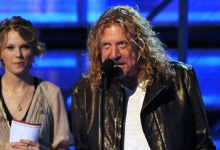
Tracks
Robert Plant & Alison Krauss: "Please Read The Letter"
(2008)
By Chris Molnar | 13 February 2009
For all the depressing stats about this year’s Grammy Awards, there was one bright spot—the voting assembly set a Guinness World Record for the largest gathering ever recorded of gray haired uncles with ponytails. It was a beautiful sight to behold: instead of turning down their hearing aids, they embraced the fact that quietly shuffling, tom-tom heavy drums now sound exactly like Bonham to them. They stopped faking appreciation for Radiohead and accepted that “tension” or “emphasis” in music now makes their Pacemakers quiver, and reminds them a little too intensely about the status of their 401Ks. In an unprecedented move they collectively sold their mint condition copies of Led Zeppelin III because in 2009, even an ancient, rasping Robert Plant is just a little too dramatic and now needs a neutral, slightly twangy female voice to negate his distinctiveness.
While these brave men celebrated after the awards ceremony, the Jonas Brothers sipped sizzurp with Lil’ Wayne while listening to Animal Collective, the four of them working late into the night to develop an airtight phenomenology of cultural relevance for peer-reviewed publication in March’s edition of Blender. But what they forgot to include (it may feature in the footnotes) was the existence of completely different scales of “cred” and relevance. To pot smokin’ Great Uncle Jonas, having Robert Plant sing his own songs at all is like you having known about Cut Copy before all your friends did. To Greezy-Grampa Weezy, the so-obvious-it-might-as-well-be-silence string part actually brings back warmish, nonoffensive memories from back on the farm.
By the time the voting masses finally adjourned they had singlehandedly discovered what makes Old Person Pop Music the cultural force it is: learning to embrace a precise sonic recreation of the deterioration of time. Lyrics are replaced with flaccid “ooohs” and “ahhs.” Musical inspiration is replaced by lazy competence and soulless studio strumming. Originality is replaced by a kind of gauzy, general familiarity that rivals the worst of Girl Talk in its nostalgic pandering, and formerly vibrant artists are trotted out from their mausoleums to mumble something nostalgish about the last letter they’ll ever send. A new milestone for music as a whole—the musical equivalent of Alzheimer’s.





